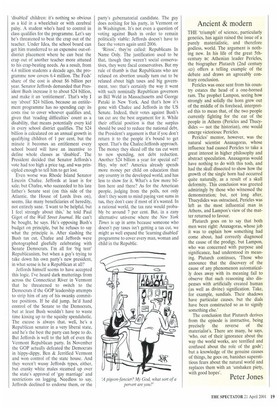Ancient & modern
THE 'triumph' of science, particularly genetics, has again raised the issue of a purely materialistic, and therefore godless, world. The argument is nothing new. In his life of the great 5thcentury BC Athenian leader Pericles, the biographer Plutarch (2nd century Al)) offers a telling example of the debate and draws an agreeably contrary conclusion.
Pericles was once sent from his country estates the head of a one-horned ram. The prophet Lampon, seeing how strongly and solidly the horn grew out of the middle of its forehead, interpreted this to mean that, of the two people currently fighting for the ear of the people in Athens (Pericles and Thucydides — not the historian), one would emerge victorious: Pericles.
Pericles' mentor, however, was the natural scientist Anaxagoras, whose influence had caused Pericles to take a great interest in higher philosophy and abstract speculation. Anaxagoras would have nothing to do with this tosh, and had the skull dissected to show how the growth of the single horn had occurred quite naturally, as a result of a skull deformity. This conclusion was greeted admiringly by those who witnessed the demonstration; but, not long after, Thucydides was ostracised, Pericles was left as the most influential man in Athens, and Lampon's view of the matter returned to favour.
Plutarch goes on to say that both men were right: Anaxagoras, whose job it was to explain how something had come about, had correctly diagnosed the cause of the prodigy, but Lampon, who was concerned with purpose and significance, had understood its meaning. Plutarch continues, 'Those who announce that the discovery of the cause of any phenomenon automatically does away with its meaning fail to observe that such reasoning also dispenses with artificially created human (as well as divine) signification. Take, for example, sundials. Their shadows. have particular causes, but the dials have been constructed so as to signify something else.'
The conclusion that Plutarch derives from the episode is instructive, being precisely the reverse of the materialist's. There are many, he says, 'who, out of their ignorance about the way the world works, are terrified and confused about the role of the gods'; but a knowledge of the genuine causes of things„ he goes on, banishes superstitious fears about the natural world and replaces them with an 'unshaken piety,
with good hopes'. Peter Jones


































































 Previous page
Previous page